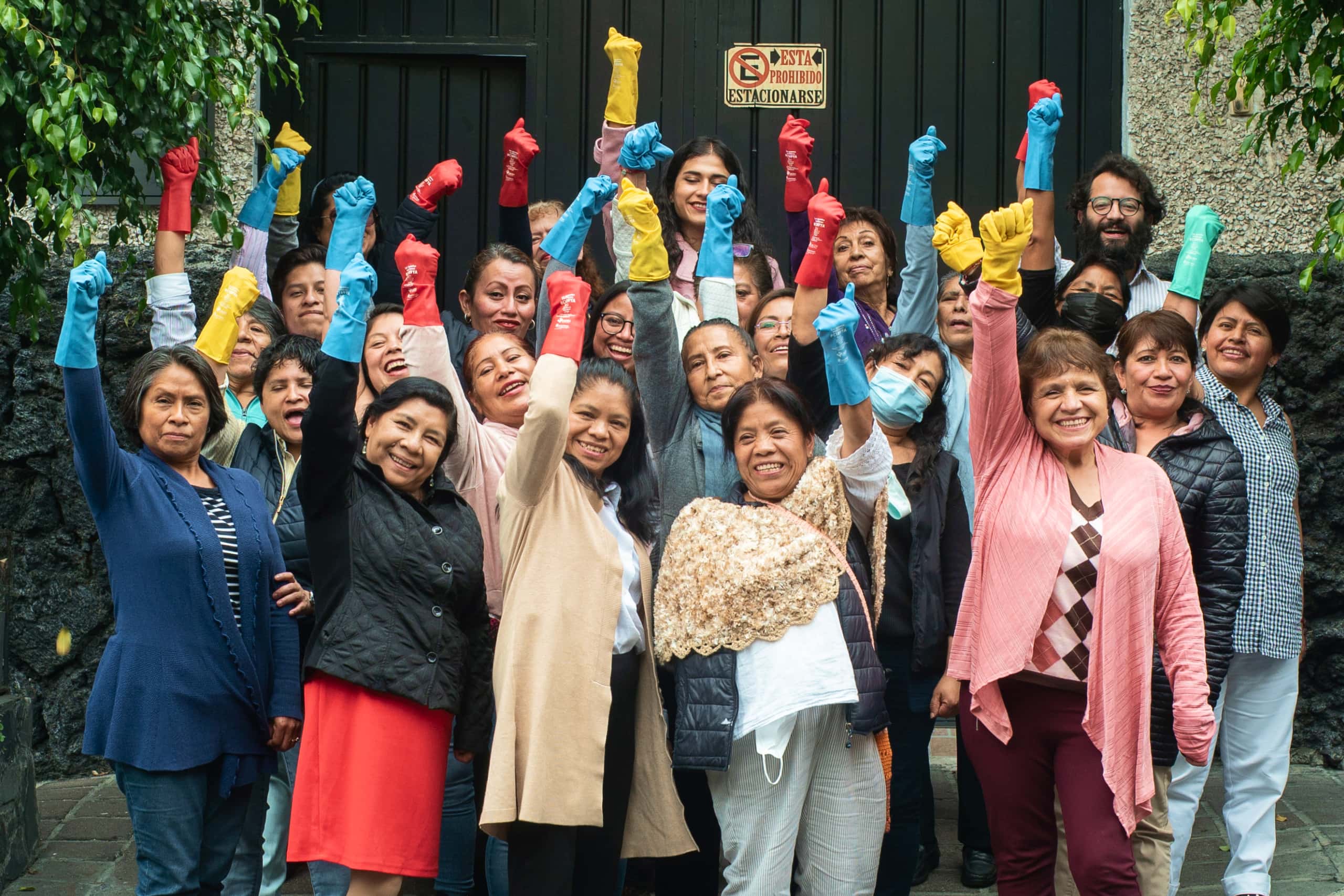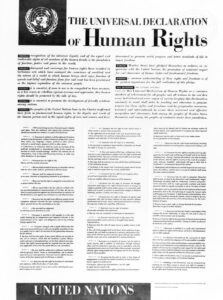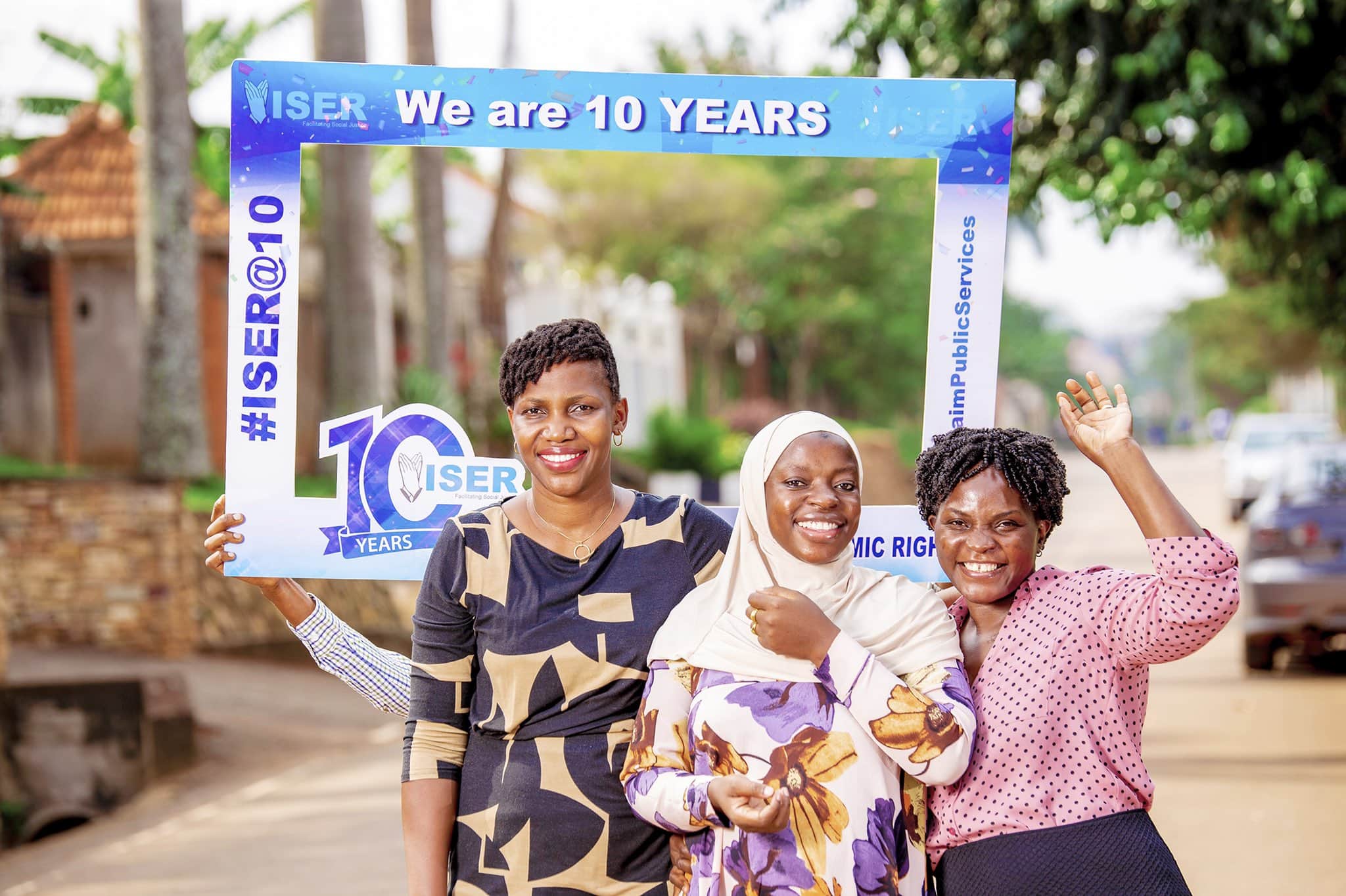As we mark the 75th anniversary of the Universal Declaration of Human Rights, here are five ways we can work together with grassroots activists to achieve even more in the next 75 years.

In December 1948, world leaders at the newly formed United Nations signed the Universal Declaration of Human Rights (UDHR)—the foundational document of the modern human rights movement.

The UDHR lays out 30 key rights and freedoms that all people—regardless of their status—should enjoy, including the right to education, the right to equal protection under the law, and the right to a healthy standard of living.
Seventy-five years later, many states are failing to adhere to these basic standards. Instead, they’ve used authoritarian tactics to silence dissent, given corporations free reign over their economies, destroyed the environment, and consolidated wealth and power.
But frontline grassroots activists are still carrying the torch for human rights. In communities across the world, these local leaders are working tirelessly to realize the power and potential of the UDHR. Where states have abdicated their responsibility to protect and provide for their people, activists are there to fill the gaps. Even in highly repressive countries, local civil society is holding the line.
As we mark this milestone for the human rights movement, we’re celebrating 75 years of incredible activism—and looking ahead to the promise of a truly rights-based future.
Here are five ways that we can work together with grassroots activists to build upon the foundation of the UDHR:
1. Redefine security and defend the defenders
Today, being a human rights activist can be one of the most dangerous pursuits on the planet. Repressive regimes are using digital surveillance, physical intimidation, arbitrary arrest, and even extrajudiciary execution to crack down on protests and close civic space.
States frame their actions as necessary for “national security.” But activists being criminalized, jailed, or killed for defending the rights of their communities isn’t making anyone safer.
Through our program on Enabling Environments for Human Rights Defenders, we’re bringing together activists to develop strategies to change the narrative around what security really means.
In Nigeria, Fund-supported activists at the Action Group on Free Civic Space authored three landmark reports that detailed their government’s misuse of security infrastructure, including surveillance technology supplied by unscrupulous transnational corporations. Their research has helped activists understand the threat and adapt to push back.
In the Philippines, a team of researchers studied the repressive regime of former president Rodrigo Duterte. They identified ways that activists responded through community and solidarity, showing how civil society can respond to an authoritarian government.
By starting a conversation about what real security actually looks like, we can begin to imagine a world where everyone—not just those with power—is safe and free.
2. Shift power to the grassroots
When people think about human rights activism, they often think of high-powered lawyers, large charities, and international institutions. But grassroots activists play a vital role in fighting for the rights of their communities. Their work might involve litigation, direct advocacy, or large demonstrations to rally public support.
It can take years or even decades for change to happen. More than anything, activists need the kind of support that will allow them to do their necessary work, however long it takes. And that means long-term, flexible funding based on trust and solidarity.
In Guatemala, five men were convicted last year for the wartime rape of 36 Indigenous women during the country’s civil war in the early 1980s. This landmark win is the result of years of tenacious activism, advocacy, and legal efforts. Fund grantee ABJP has supported their case for more than a decade.

In Uganda, ISER recently celebrated their 10-year anniversary. The Fund has supported ISER since 2012, before the fledging organization had the systems and processes in place to access funding elsewhere. Today, ISER is an award-winning advocate for education, access to healthcare, economic empowerment, and more. With long-term, flexible support, they’ve been able to fight for the rights of all Ugandans.
These activists are vital partners. And it’s up to us—as a funder and an ally—to help ensure they are well resourced and able to fulfill their visions for change.
3. Demand climate justice
The UN panel on climate change says that the Earth is speeding toward catastrophe—in the next decade, we’re likely to cross a critical threshold. Communities living on the front lines of climate change are among the most marginalized in the world. Often, those least responsible for causing this crisis are bearing the worst brunt of its effects.
Grassroots activists, who come from and work in the communities most severely impacted by climate change, are developing viable solutions on the front lines of the crisis.
In Mexico, where invasive development projects threaten Indigenous peoples’ lands and livelihoods, activists are pushing back. Fund grantee Indignación helped organizers from one Mayan community resist a massive industrial pig farm that would have threatened their local ecosystem.
In the Philippines, CIEJ is standing up to powerful companies who want to bring open-pit mining to one of the country’s key agricultural regions. This type of mining would destroy farms, pollute the area, and threaten food security and clean water for the 975,000 people who live there. Working with the Legal Rights and Natural Resources Center, they already won a case upholding a ban on small-scale projects. And with our support, they continue to push back on large-scale mining operations.
Activists have answers to the climate crisis. But they need more resources and more support to scale their solutions.
As a funder, we’re proud to support the visionary work happening in frontline communities. The Legal Empowerment Fund, a program of the Fund for Global Human Rights, recently launched a call for proposals from grassroots groups in Southeast Asia who are using legal empowerment strategies to tackle the climate crisis. By resourcing their innovative efforts, we can help ensure that the most impacted communities are able to make their own decisions about their future.
4. Build a new economy that works for all
Economic justice is central to human rights. But wealth and power have been concentrated in the hands of the privileged few. Deregulation of the global economy has fostered a system that rewards greed and deepens inequality. Labor protections have been eroded. And social welfare—a key part of the UDHR—is increasingly out of reach for those who need it.
Grassroots groups are changing their economic realities from the ground up by radically reimagining how our global economy could function.

In Mexico, Fund grantee CACEH formed the country’s first-ever domestic workers union. Marcelina Bautista, the founder of CACEH, became a domestic worker at age 14. Now, she’s helped millions of other domestic workers—mostly women—fight for basic protections like a minimum wage and sick leave.
In Liberia, the youth activists of YOCEL are betting on economic empowerment as a pathway to realizing other human rights. In a country where poverty is high and wages are low, they realized that young people were acutely worried about access to economic opportunity—especially after the COVID-19 pandemic. They believe that overcoming economic injustice and improving livelihoods will create a stronger foundation for other rights to flourish.
These are actionable alternatives to our failing status quo. By supporting grassroots approaches, we can help build a global economy that works toward the needs, well-being, and safety of everyone.
5. Innovate for the future
Activism isn’t just protesting or challenging abuses in court. Around the world, activists are finding innovative, creative ways to call out injustice and demand their rights.
In the Indian state of Maharashtra, the Fund worked with a popular YouTube channel and a local media collective to organize a stand-up comedy tour that featured marginalized Marathi voices. The budding comics—including sex workers, farmers, and people from remote villages—had the opportunity to reach a huge audience with their stories. The result was a smash hit—more than 100,000 people have watched the YouTube video about their tour.
Young people, especially, are brilliant advocates for their own issues. But they’re rarely afforded a seat at the table. In Sierra Leone, the Fund partnered with feminist movement builder Purposeful to launch a novel participatory grant-making initiative. With our support, a panel of local youth activists considered proposals from other youth groups and decided who would receive funding. By putting the power in their hands, we empowered them to define and lead their own agendas.
These novel approaches to activism are necessary for the future of human rights. For 75 years, the UDHR has inspired people to fight for our collective rights. As we look to the challenges and opportunities that lie ahead, the UDHR remains a powerful tool in the hands of determined activists. We are proud to support their vital work and we look forward to achieving even more together over the next 75 years.
Sign up to our newsletter
Add some impact to your inbox.
By submitting this form, you accept that your data will be stored and processed in line with our Privacy Policy.


